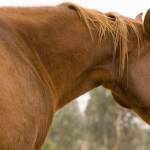Feeding Horses with HYPP

Clinical symptoms of hyperkalemic periodic paralysis (HYPP), a metabolic disease characterized by muscle twitching and trembling, coincide with excessive potassium concentrations in the blood. Limiting potassium intake is, therefore, one of the most effective management steps for keeping HYPP-positive horses free of clinical symptoms.
How do horse owners revise a diet to keep potassium levels low and horses safe?
For most horses, forage is the major dietary source of potassium, though the amount can vary based on plant species, soil characteristics of the field in which plants were grown, rainfall, and stage of maturity at harvest. Nutrient analysis can help owners choose hay with low potassium content, and an equine nutritionist can help interpret forage-analysis reports.
In general, grass forages have lower potassium content than legume forages. Bermuda grass, prairie grass, and timothy are suitable forage choices for horses diagnosed with HYPP. Soaking hay might leach some of the potassium from hay and constitutes an added layer of safety. Grazing good-quality pasture is ideal because the high water content of fresh grass keeps absorbed potassium at a low level.
Commercial feeds that contain large amounts of soybean meal, soybean or canola oil, dehydrated alfalfa (lucerne), or molasses should be avoided. Suitable energy sources include oats, corn, barley, and unmolassed or rinsed beet pulp.
The feeding schedule for HYPP-positive horses should include two to three small grain meals over the course of the day, assuming body condition cannot be maintained on forage and an appropriate vitamin and mineral supplement or ration balancer. Multiple meals reduce fluctuations in blood insulin concentrations that in turn help maintain normal blood glucose and potassium concentrations. Insulin promotes the uptake of potassium by the muscle cells, thus reducing serum potassium concentrations.
Careful thought should be used in providing HYPP-positive horses with supplemental electrolytes, as many of these products contain potassium. Plain salt or potassium-free products would be the best choices for these horses.
Do you know if your horse is affected by HYPP, a genetic disease characterized by unusual muscle tremors? Learn more about HYPP testing.
Still unsure of how to best feed your HYPP-positive horse? Share a few details with a Kentucky Equine Research (KER) nutrition advisor to get the ball rolling.








